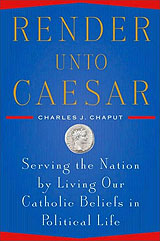
Bishop makes solid arguments for faithful to vote their conscience
|
This review first appeared in the October 26, 2008 issue of the North County Times.
In an election season when volatile policy issues like teen-age abortion and same-sex marriage are on California's ballot, the intersection of faith and politics is once again on the country's radar.
Archbishop Charles J. Chaput, the leader of the Roman Catholic diocese in Denver, has written "Render Unto Caesar," a book that takes a look at public attitudes toward the faithful – specifically, the Catholics – and how they cast their votes at election time.
More important, he looks at how faithful Catholics themselves often view their role as voters – and how (and even whether) their religious values should inform their votes.
Chaput sets up the topic by first exploring the uneasy relationship of the United States and its Catholic minority. From the earliest colonial times, when Catholics were viewed as outsiders by the Protestant majority, through John Kennedy's declaration that his faith and his civic duty were separate, Chaput illustrates how Catholics often have been fed the implicit message that they must choose between patriotism and piety.
He then explores the issue from the religious side of things: how early Christian leaders distrusted government authority, and how the church itself was corrupted when it became part of the ruling system in the late Roman Empire through the Renaissance.
The middle part of the book is likely to be of most interest to practicing Catholics. Chaput lays out exactly what church teaching is regarding Catholics participating in politics in a free, democratic society such as ours. He points out that bishops and priests should avoid making detailed endorsements, except in extreme cases of public policy that (in the Church's teaching) violate fundamental human rights.
He also explains the Church's position in the recent cases of Catholic politicians who support legal abortion being denied Communion – that this was never intended as punishment, but rather is simply recognition that the individuals in these cases have already broken with fundamental church values through their public behavior.
Chaput summarizes this section by noting, "The church claims no right to dominate the secular realm. But she has every right – in fact, an obligation – to engage secular authority and to challenge those wielding it to live the demands of justice."
Perhaps the most interesting for non-Catholics (or those Catholics unfamiliar with their faith) is the part where he explains that the Catholic Church is not a top-down corporation, but is more akin to a network of families – and is far more defined by the actions of its billion or so lay members than it is the few thousand bishops who seem to get most of the media's attention.
The book's main weakness to this reviewer (raised and still nominally Catholic) is that Chaput aims it too narrowly at his fellow Catholics. Yes, Catholics are often presented with the secular argument that in order to prove their loyalty they must deny their faith. But evangelical Christians (the so-called Religious Right) and Mormons also are regularly charged with "trying to impose their beliefs on others" for acting on their consciences. And perhaps even more than Catholics, Islamic Americans see their loyalty to the United States doubted simply because of their faith.
There was a larger lesson to be taught about the growing intolerance toward all people of faith, and it's disappointing that Chaput didn't explore that in this book.
And while it's understandable that a bishop would frame his arguments for civic participation within the framework of his faith tradition, it's somewhat surprising that Chaput didn't illuminate the utter contradiction of the main argument of the aggressively anti-religion folks: If, indeed, morality is relative and no belief system is superior to another, then the religiously minded are every bit as justified in voting their beliefs as the most committed atheist. After all, all voters are trying to see their beliefs reflected in society's laws.
Those who are fundamentally opposed to religious believers voting their values will not have their minds changed by this book; those who are unsure of the proper role of faith in the public square, or Catholics unsure of their church's teachings, however, should find much to chew on in these pages.
In the logical coherence of his arguments and the compelling case he makes that Catholics only truly fulfill their patriotism when they vote with their whole being, Chaput presents a solid contribution to the ongoing discussion about religion in the United States.
